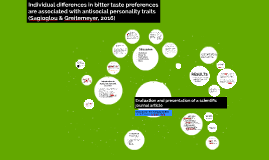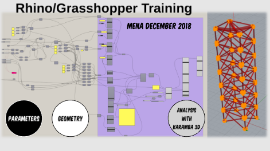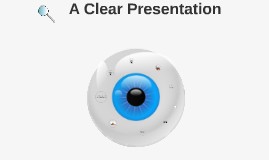Evaluation and presentation of a scientific
Transcript: Individual differences in bitter taste preferences are associated with antisocial personality traits (Sagioglou & Greitemeyer, 2016) Group name: The everyday sadists Glenn, Thomas, Øystein & Vilde Correlational study Online Survey Cross-section design Bivariate correlations Multiple regression Aim: Testing the notion that liking of bitter tastes is associated with an increased presence of antisocial personality traits. The dark Triad is a personality construct that comprises Machiavellianism, psychoticism and narcissism (Paulhus & Williams, 2002). Sadism and hostility also constitutes noxious personality traits. Based on the reasoning that experiencing bitter tastes early contributes to the preferences for bitter substances the increased preferences for bitter taste should be related to a more hostile personality...? Sweet taste has been found associated to prosocial traits (Meier, Moeller, Riemer-Peltz, & Robinson, 2012). Supertasting versus Nontasters Openness to experiences --> fruit and vegetables consumption (Keller & Siegrist, 2015), neuroticism --> unhealthy food consumption was linked as well as overeating behavior. In rats it was found that low saccharin intake gave lower social status as well as increased impulsivity and stress vulnerability (Carrlo, Morgan, Anker, Perry, & Dess, 2008). Sensation seekers --> spicy food (Byrnes & Hayes, 2013), and caffeine (Mattes, 1994) Overall, some connection between taste preferences and personality has been established, yet the evidence is still scarce. Limitations Strengths Implications Contributions Ethics Discussion General bitter tastes were correlated with sour preferences, which were significantly positively correlated with trait aggression and everyday sadism. Sweet food preferences positively correlated with agreeableness. Bitter food preferences also predictor of extraversion. Limitations of the study Introduction to study, background and aims Study 1: The relation between bitter taste preferences and antisocial psychological propensities. Adequate payment of the participants Have to consider the possible impact of what the findings suggest. Possible debriefing around the findings - that people who like bitter food are sadists, narcissists and have high scores of psychopathy. The authors declare no potential conflict of interest regarding the authorship, research, or publications. The authors received no financial support for the research The results of both studies confirmed the hypothesis that bitter taste preferences are positively associated with personality traits, with the most robust relation to everyday sadism and psychopathy. Both studies rely on self-reports Relationship between two variables Regression analyses confirmed that this association holds when controlling for sweet, sour, and salty taste preferences and that bitter taste preferences are the overall strongest predictor compared to the other taste preferences. Gives iu insights into the relationship between personality and the behaviors of eating and drinking by demonstrating a strong relation between increased enjoyment of bitter foods and heightened sadistic tendensies 1. Scale from 1 - 6, their preference for various food items representing either sweet (i.e candy), sour (i.e lemons), salty (i.e potato chips) or bitter (i.e coffee). In total 40 items, 10 of each category 2. 6-point scales how much they generally liked sweet, sour, salty, and bitter foods and drinks 3. Buss-Perry aggression questionnaire, 12-item Dark Triad measure, ten-item personality inventory, Big Five and Comprehensive Assessment of Sadistic Tendencies. Two studies were conducted, with a relatively large amount of participants. MTurk:participants, representative compared to undergraduate students, more diverse age and background. Study 2 is more specific than study 1, and measures the participants preferences for several sample food items Consistency checks to evaluate the quality of the data Most of the results from the second study are in line with the first. Study 2 has separated bitter foods and bitter drinks in the questionnaire, increasing reliability ✳✱* RESULTS How suitable is the applied research design to answer the research question? Evaluation and presentation of a scientific journal article Contributions METHODS Study 2: Test inconsistency between the taste preference in the bitter items, (i.e sweet vs bitter tea) Measured only sweet and bitter items. Reduced number to 20, 10 of each Basic or replied research? Reveal people with antisocial features The link between personality traits and preferred foods can be used in marketing, and potentially other social arenas. Bitter tastes- Coffee, beer, radishes, tonic water, and celery. Why we choose this article? Introduction to the study Methods Results Discussion Class activity How different IVs affect a DV IVs: Bitter, sweet, sour, salty DVs: Machiavellianism, Psychopathy, Narcissism, Everyday sadism Rationale Taste preferences are treated as

















